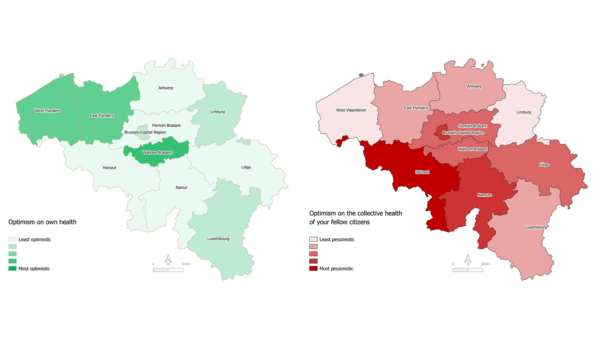***
These bullet points, however, capture the first results of our Optimism Barometer:
- How optimistic are we about our health?
It appears Belgians, of all age categories, are more optimistic about their own health than that of their fellow citizens. 68% of the participants is either optimistic or very optimistic about his/her own health. Only 46% appears to be optimistic to very optimistic about the health of their follow citizens. This effect is also known as optimism bias. Optimism, however, decreases with age.
When looking at the geographical distribution, the people from Hainault (Henegouwen) are the most pessimistic about the health of their fellow Belgian citizens (32% is little to completely not optimistic).
- How optimistic are we about the economy?
65% of the participating Belgians are pessimistic about the economy. Striking is the fact that the self-employed and company owners are most optimistic among the working population: 22% of them is either optimistic or very optimistic. This is 14% for employees and only 8% for civil servants.
95% believes that the virus can be contained efficiently by respecting the measurements taken by the authorities, with figures up to 97% for the category older than 65y. The youngest category (-24y) is least convinced about this (91%).
43% of the participants expects that the economy will recover by the end of this year. For self-employed participants and company owners, this number goes up to 46%.
- Evolution of the work-life balance
52% of the surveyed Belgians experience an impact on their work-life balance - either in a positive (25%) or a negative (27%) way. This impact is stronger among women than men.
Employees who (fully or partially) work from home experience a greater positive impact on their work/life balance (43%) than employees who do not (or cannot) do so (25%).
More than 1 out of 2 Belgians experience an impact on their work-life balance.
- Connection with family, friends & colleagues
The connection with family members has remained unchanged for half of the Belgians (53%). If we do notice an impact, it is more often positive (32%) than negative (8%).
Also, the connection with our friends has not changed for half of the Belgians. Nevertheless, the evolution more often points in a negative (37%) than in a positive direction (12%).
Teleworking influences the bond we have with our co-workers. 39% of the surveyed teleworkers experience a negative evolution in the relationship with their colleagues. Only 29% of the non-teleworkers experience a negative evolution in the connection with colleagues since the corona crisis.

- Travel plans
For 1 out of 2 interviewed Belgians travel plans have been affected: either because they have had to cancel booked holidays (21%), or because they will not book holidays anymore (30%).
- Other key facts
24% of the surveyed Belgians is currently (partly) unemployed.
Half of the employed participating Belgians currently works full-time from home. An additional 17% does so partially.
These results are based on data collected from 5082 interviews, weighted using a representative Belgian distribution, based on sex, age and province.




